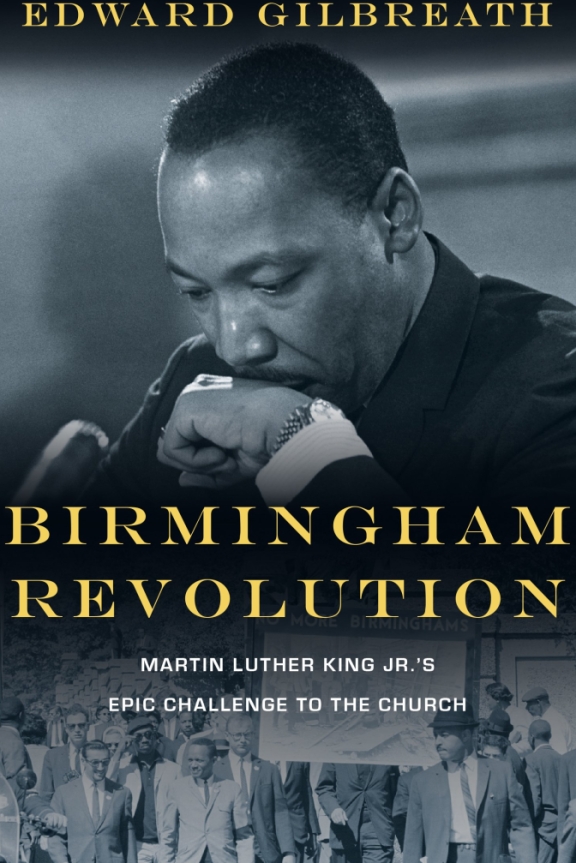Dr. King, “was called to lead an unlikely movement, at a particular moment in time, against an immense system of social injustice.”
~ Birmingham Revolution ~
It was 1963, in Birmingham, Alabama, ground zero in a seminal year of United States history and the Civil Rights movement. Dated April 16, 1963, Dr. Martin Luther King Jr.’s “Letter from Birmingham Jail” is considered a 20th century epistle, and one of the most important historical documents of the century. Yet I had never heard of it.
With Letter from Birmingham Jail at it’s center, the book Birmingham Revolution by Edward Gilbreath is two things; first a concise description of the struggle for Civil Rights in the 1950’s and early 60’s, leading up to and focusing on Birmingham in 1963. Second, it takes an honest look at the issue of race relations and the Christian church, from the 1960’s up to the present day.
Researching both fiction and non-fiction books very carefully, I enjoy reading biographies every once in a while. It’s because I desire to find the best books, always wanting it to be worth my time. As Frank Zappa said, “So many books, so little time.”
Thankfully, Gilbreath’s Birmingham Revolution was brought to my attention through a review on a blog I follow, Bob on Books (check out his review here). Interested in finding a good biography on Dr. Martin Luther King Jr., this sounded like a good starting place. I made note of the book on my “to read” list. It took me two and a half years to finally get a copy of the book and read it.

Even better than I had hoped, this is one of the best, and most important books I’ve ever read. Prior to reading the book, my remedial knowledge of this time in history included some general facts, and an awareness of the evils of racism and how it was expressed, especially in the South.
Gilbreath’s succinct narration of the events and characters bring a clear understanding of the immense importance of these moments in history.
But it’s his presentation of the culture at large, and most importantly the white Evangelical church, and it’s lack of understanding, much more then, but still even now, that really hit home. The civil rights movement was very clearly a church movement. It was birthed in prayer meetings, and led by pastors, of whom of course Dr. King became most prominent.
Nothing but a “Guilty” plea can be entered on my behalf when it comes to what at best can be called my disinterest in what living in the U.S. is like for African-Americans in the 21st century.
Believing as Dr. King said in his “I have a dream” speech, that no one should “be judged by the color of their skin,” I affirmed that sentiment, yet have done little else. But I’ve come to face the fact that I’ve sorely fallen short, having avoided addressing the deep roots of racial tension that continues in our country.
My thinking was, things have gotten better in the last 50 years, haven’t they? To be an African-American today is nothing like it was back then, is it? An African-American, President Barack Obama was elected to two terms as the most powerful man in the world.
Still I admit, I have for the most part worn blinders to the vestiges of racism that for so many, is still very much a part of their daily lives.
As is pointed out in the book, “the civil rights movement was grounded in the church and the holistic gospel of Jesus Christ.” There is the scripture that speaks of all Christians being the body of Christ, and when one part hurts, we all hurt. But I took too little notice of that hurt.
On his website, Gilbreath states that he, “hope[s] to build bridges of understanding across the racial, cultural, and ideological divides in our society.”
It all goes back to the basic teaching of Jesus – Love Your Neighbor.
Gilbreath challenges the church, and therefore me personally, to put this part of the Gospel into action. His book Birmingham Revolution has been a real call to action for me.
There’s so much work to be done, so much healing that needs to take place. In whatever way I can I want, I need, to be part of the change. To build “bridges of understanding” between Black and White, and all races.
~ ~ ~
“The thing that is often overlooked is that the civil rights movement was a church movement. The leaders were pastors, and the mass meetings were church services, with prayers, hymns, sermons, and offerings.”
~ Robert Graetz, a local white Alabama pastor of the all-black Trinity Lutheran Church ~ Birmingham Revolution

Nice…
Thank you!
You posted this a year and a half ago, and it could not be more relevant today.